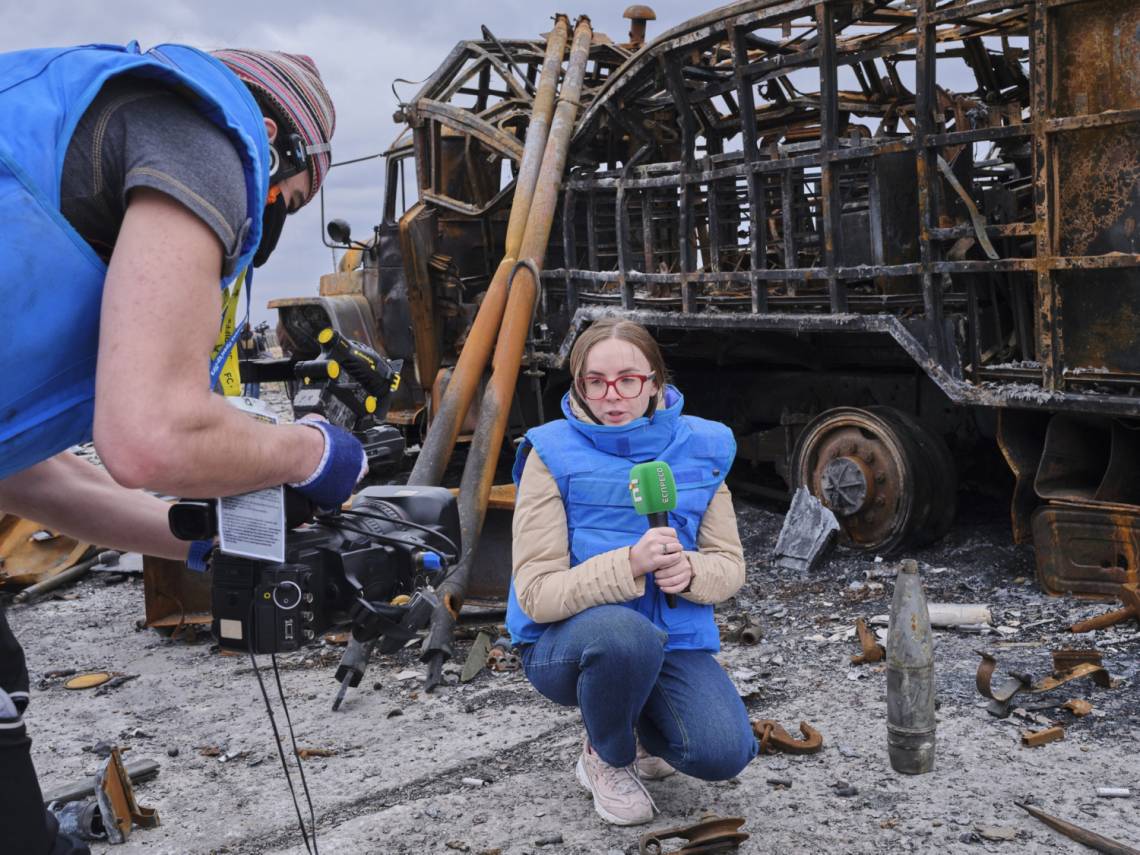Whether it is general in nature or relates to humanitarian or legal matters, information is crucial for the people affected by the war in Ukraine. Since the Russian onslaught began on 24 February 2022, local independent media – particularly in the areas that have been annexed or subsequently recaptured – have been relying on support to survive and carry on fulfilling their role. Against this backdrop of war, information professionals must adapt both their practices and their means of dissemination. While the purpose of their work – to inform their audience and bear witness to what is happening – is clearer than ever, they still face the challenge of striking an appropriate balance and trying to avoid putting anyone at risk. “In Ukraine, we have learned that information saves lives,” explains Oleksiy Soldatenko, coordinator for the non-profit organization Fondation Hirondelle in Ukraine. Since the war started, Fondation Hirondelle has rolled out an emergency support program for Ukrainian journalists and independent media. This initiative is funded by Swiss Solidarity and private donors.
As noted at the KOFF roundtable on media and information in October 2022, which featured Fondation Hirondelle’s General Director Caroline Vuillemin, the media are sometimes regarded by peace actors as agents or drivers of conflict. Yet, Fondation Hirondelle’s experience suggests that if the media pay due respect to the fundamental values of journalism (such as public interest, balance, and ethics), they can serve as a genuinely useful tool for peacebuilding and dialog. As Caroline Vuillemin explained, this kind of journalism paves the way not only for building public trust, but also for creating space for dialog based not on absolute truth but on a shared reality and a common understanding of the facts of a given situation.
While the war is impacting the way journalists work, it is also leaving its mark on the content circulating in certain media. Disinformation, which had already been widespread during the war in Donbas, has now been taken to a whole new level. “There is a war of information,” notes Oleksiy Soldatenko, “in other words, a battle for people’s mind and trust.” Within this environment, social networks can develop into highly effective channels of false information, which often manage to evade the platforms’ moderation processes.
Supporting local media, especially in annexed or recaptured areas, gives them the means to survive, to carry on producing content and, in doing so, to combat disinformation campaigns. Information that is verified and reliable has practical value, but its psychological importance is also crucial. It enables informed decision-making and provides support for listeners and readers who are otherwise cut off. This assessment is borne out by the feedback we have received regarding our support: most of the media organizations that have benefited from our emergency program have been able to improve both the quantity and the quality of their content. Even though the occupied regions are plagued with restrictions and internet blackouts that make information difficult to access, these media have managed to retain their audience or even increase it (in some cases by up to 50%).
Another battle being fought, and an equally strategic one, is the fight for justice. Ukraine decided very early on to take up legal arms on both a local and an international level as part of its defense strategy. In media circles, judicial reporting is seen as a specific type of journalism that requires particular expertise. The rapid implementation of both local and international legal proceedings relating to the war has given rise to a need for training and support for the Ukrainian journalists covering these cases. Reporting on the legal front of the war involves drawing public attention to proceedings and the methods used to get to the truth behind the crimes committed, as well as providing the keys to understanding the role and jurisdiction of the local, national and international courts and tribunals. In this awkward position of being both citizens, and therefore victims of conflict, but also objective observers, information professionals face a particularly significant challenge – and this is where Fondation Hirondelle wanted to focus its support.
In response to this situation, our own online media JusticeInfo.net, which focuses on issues relating to international and transitional justice, has also got involved in training and supporting Ukrainian journalists tasked with reporting on legal proceedings linked with the war in Ukraine. Thierry Cruvellier, Editor-in-Chief of JusticeInfo.net, describes covering trials for war crimes as “telling the story of the occupation” from the victims’ perspective and in real-time. Two training schemes, which also involve local judges and other experts, have been in place since July 2022 and have proven to be very popular. Furthermore, the JusticeInfo editorial team is making an effort to help share this coverage by publishing the articles produced on its own platform in four languages (Ukrainian, Russian, French, and English). Lastly, JusticeInfo is working with its correspondents in the Hague to cover and analyze all proceedings initiated at the level of the international courts in connection with the war in Ukraine.
*This article was published in the February 2023 edition of the Swiss peacebuilding platform KOFF's magazine "À propos".
